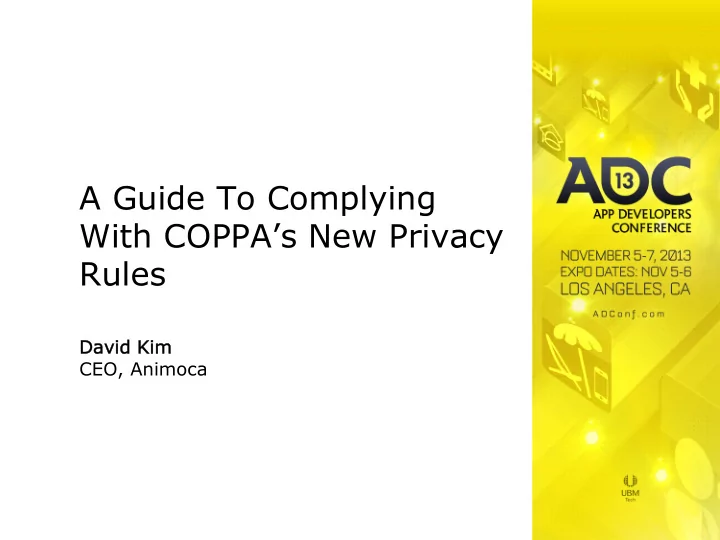

A Guide To Complying With COPPA’s New Privacy Rules David d Kim CEO, Animoca
What is COPPA? ● Enacted in 1998 by the FTC ● Title XIII: ● Operators of web sites or online services ● That collect PII from a child ● Must provide notice on what is collected, how it is used & the disclosure practices ● Must also obtain verifiable parental consent ● Penalties of up to $16,000 per violation
What is PII? ● Any information about an individual maintained by an agency, including ● (1) any information that can be used to distinguish or trace an individual‘s identity, such as name, social security number, date and place of birth, mother‘s maiden name, or biometric records; and ● (2) any other information that is linked or linkable to an individual, such as medical, educational, financial, and employment information.
The New COPPA Rules ● Went into effect in July, 2013 ● First changes since 1998 ● Required 4 years of discussion ● Intended to keep up with advances in technology
New Rule #1 ● Expanded definition of “PII”: ● Geolocation information ● Photographs ● Videos ● Audio files ● Screen names ● Previous list included: ● Name ● Postal Address ● Phone number ● Email address ● IP address
New Rule #2 ● Kid-directed apps and websites cannot permit third parties to collect personal information from children through plug-ins without parental notice and consent
New Rule #3 ● Site operators and app developers can no longer collect persistent identifiers that can recognize users over time and across different online services, such as mobile device IDs
New Rule #4 ● Businesses must take reasonable steps to release children’s personal information only to companies that are capable of keeping it secure and confidential
New Rule #5 ● Businesses must adopt reasonable procedures for data retention and deletion.
New Rule #6 ● The FTC has strengthened its oversight of the approved self-regulatory “safe harbor programs” ● Requires them to audit their members and report annually to the Commission
How To Comply – Step 1 Audit your privacy policies What you collect ● What you do with it ● How you store it ● How long you keep it ●
How To Comply – Step 2 Implement parental approval mechanisms: Signed consent form ● Credit card or payment system ● Toll-free phone number ● Video conference ● Government issued ID ●
How To Comply – Step 3 Update your privacy policy to include: list of all operators collecting personal ● information description of the personal information ● collected and how it’s used description of parental rights ●
How To Comply – Step 4 Honor parents’ ongoing rights with respect to information collected from their kids: give them a way to review the personal ● information collected from their child; give them a way to revoke their consent and ● refuse the further use or collection of personal information from their child; and delete their child’s personal information ●
How To Comply – Step 5 Implement reasonable procedures to protect the security of kid’s PII: Minimize what you collect in the first place ● Release PII only to service providers capable ● of maintaining its confidentiality & security Get assurances they’ll live up to those ● responsibilities Hold on to PII only as long as necessary ● Securely dispose of it once you no longer have ● a legitimate reason for retaining it.
How To Comply – Step 6 Take stock of any third parties: Ask what data they collect ● Ask what they do with the data ● Make sure they comply with COPPA ● If not, remove them until they do ●
Impact on Animoca We had to review what it means for an app to be “directed to children” ● subject matter ● visual content ● use of animated characters or child-oriented activities and incentives ● music or other audio content ● presence of child celebrities or celebrities who appeal to children ● language or “other characteristics”
Impact on Animoca
Which Games are For Kids?
Proceed With Caution
Not Just in the US ● E-Privacy Directive (Europe) ● Personal Data Privacy Ordinance (Hong Kong) ● Act on the Protection of Personal Information (Japan) ● Data Protection Act 1998 (UK) ● Privacy Act 1988 (Australia) ● Personal Information Protection and Electronic Documents Act (Canada) ● Etc.
Q&A Thank you!
Recommend
More recommend